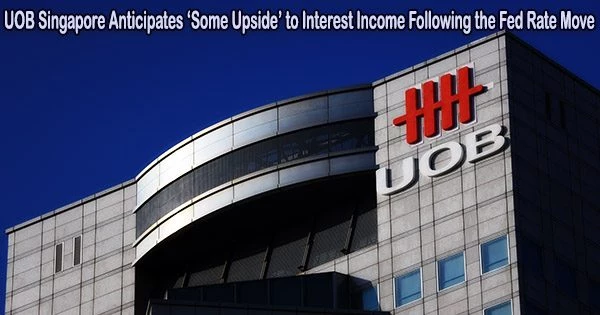United Overseas Bank in Singapore anticipates “some upside” in interest income in the upcoming quarter as a result of the U.S. Federal Reserve’s overnight announcement of a new rate hike.
In the second quarter compared to a year before, UOB’s core net profit increased 35% to 1.5 billion Singapore dollars ($1.13 billion). The Singapore-based lender said in a statement posted early Thursday that its net interest income for the quarter increased 31% from a year earlier, helped by a strong net interest margin that increased 50 basis points to 2.13% on higher interest rates.
The difference between interest earned and interest paid is known as net interest margin, and it serves as a gauge of a bank’s lending performance.
“We are hopeful that net interest margins will stay for the following quarter, with some upside biasness following this morning’s announcement by the Fed,” UOB chief financial officer Lee Wai Fai told CNBC’s JP Ong on “Street Signs Asia” in an exclusive interview Thursday.
Overnight on Wall Street, the Fed raised interest rates by 25 basis points, taking its benchmark borrowing costs to a target range of 5.25%-5.5% the highest level in more than 22 years.
Financial markets had completely priced in the widely anticipated move. The midpoint of that target range would be the highest level for the benchmark rate since early 2001.
Shares of UOB, one of Singapore’s largest lenders, rose 0.7% to a three-month high on Thursday.
The stock was broadly in line with the benchmark Straits Times Index in Singapore, and slightly below the 1% gain for the MSCI Asia ex-Japan.
Forward guidance
“We think that loans will be repriced and that we will be able to manage our cost of funding a lot stronger mainly because of the flight to quality for the Singapore depositors,” Lee said.
The third-largest lender in Southeast Asia reported that its wealth management and loan-related fees had decreased as investor mood remained muted. A rise in card fees, the bank continued, partially offset these losses.
On Thursday, UOB lowered its guidance for fee income guidance to a high single digit growth, from a double-digit growth projection at its first quarter earnings announcement.
The bank’s projection for low to mid single-digit loan growth remains unchanged.
It now expects credit cost to hit around 25 basis points for the rest of the year, a slight increase from the previous projection of 20 to 25 basis points.
“We are hopeful that despite a challenging first half, second half will be a lot better. And with some of the reopening of the economy, some of the trade-related activities will pick up,” Lee told CNBC.
“We are expecting to see activity coming back, especially now people got used to the high interest rate environment … so we see some of those customers coming back into the market,” he said.
UOB is the first of Singapore’s three major banks to report its quarterly earnings. Singapore’s largest lender DBS will report Aug. 3, followed by Overseas-Chinese Banking Corp. on Aug. 4, 2023.
















